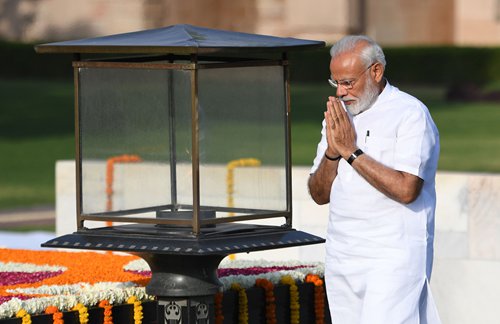Continuity, not change, expected from Modi 2.0
By Xie Chao Source:Global Times Published: 2019/5/29 20:38:40
Modi 2.0: Continuity more likely than change

Photo: VCG
On May 23, the marathon general elections in India ended with the BJP-led National Democratic Alliance (NDA) winning a landslide victory in the Lower House of the Indian parliament. Pulwama attack helped reset the campaign agenda. Before the incident, the electoral discourse was about economic policies such as demonetization and GST reforms and the job market.
For the months to come, the front pages of major Indian newspapers were full of debate on whether Indian fighter planes had shot down anything and if the surgical strikes hit any important target. Admit it or not, the Modi wave is a sustained one and has enabled the BJP to consolidate its position within the NDA and the Lower House of parliament. It is safe to conclude that Modi's second term, which can be called Modi 2.0, will involve more continuity than change. In the realm of foreign policy, the strong personal style of Modi 1.0 will continue and the role of strong political leadership will be more important than ever in a changing atmosphere on international political economy.
Regarding relations between India and China, the pragmatic realism will continue in Modi 2.0. Both countries have decided to reaffirm history of cooperation in many multilateral settings. The fact is that their engagement in multilateral frameworks was not sidelined by their differences, even during the Doklam standoff. India has acceded to the expanded Shanghai Cooperation Organization (SCO) and is a top borrower in the China-initiated Asian Infrastructure Investment Bank. As two fastest growing economies, India and China's interactions thus hold particular implications for the trend of major power relations. Amid resurgent waves of unilateralism, multilateralism is now under stress.
Instead of indulging in competition for status, India and China are actually trying to view each other in terms of opportunity and trust, and this became clearer after 2018. During his speech at the SCO Summit in June 2018, Modi stressed that connectivity with neighboring nations and within the SCO region would be the top priority of his government. There are signs that India has matched its deeds with words, such as when it declined to invite Australia to join the Malabar 2018 exercises and stressed that there was "no need to give [a] military angle to the Quad."
Furthermore, there has been more room for both sides to test constructive interactions in other multilateral frameworks such as BIMSTEC, SAARC and the China-proposed Belt and Road Initiative. As a sign of positive interaction, China offered to cooperate with India to help a third country improve its infrastructure, which India accepted. The Indian minister of external affairs made clear that it could work with China on infrastructure projects in Afghanistan and that such cooperation would not be affected by Pakistani factors.
The Chinese government chose not to further oppose the addition of Masood Azhar to the United Nations blacklist, and the consent was given before Modi could claim victory in the general election, a clear sign of China's endorsement of the Indian leader's handling of China policy.
The first thing that is expected to happen in Modi 2.0 is the second informal summit between President Xi Jinping and Modi. Both sides had strong incentives to continue the momentum created by the Wuhan informal summit but had to postpone it due to the general elections in India. Many things will be discussed, such as dealing with border issues in a more matured way, deepening bilateral economic ties, and coordinating moves against US trading bullies. Much can be accomplished in joint projects in a third country, too.
With such positive interactions, both sides will have to show sincerity and build trust to create an inclusive cooperation model. It is only then that the vision of deep mutual trust and their collective rise in the region can be achieved.
The author is an assistant research fellow, Institute for International and Area Studies, Tsinghua University, and a visiting faculty scholar (2018-19), Jindal School of International Affairs, O.P. Jindal Global University, India. opinion@globaltimes.com.cn
Newspaper headline: Modi 2.0: Continuity more likely than change
Posted in: ASIAN REVIEW,CHINA-INDIA